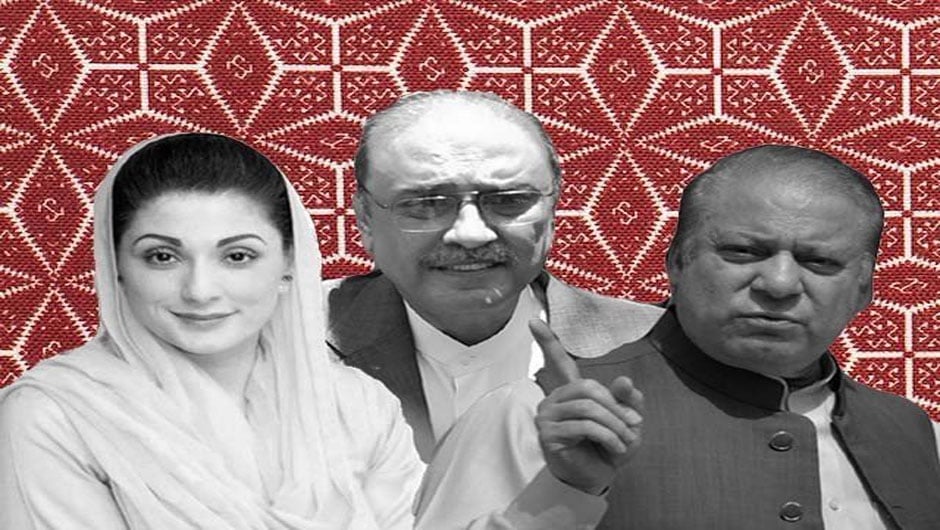
 2019 will soon be a past tale but for the country’s political prisoners, the struggle is far from over yet.
2019 will soon be a past tale but for the country’s political prisoners, the struggle is far from over yet.Prime Minister Imran Khan came into power last year, vowing to root out corruption from the country. Since then several politicians, who remained unchallenged in the past, were sent behind bars in different cases.
Following a disqualification in 2017, next year an accountability court had sentenced former prime minister Nawaz Sharif to seven-year imprisonment in Al-Azizia reference case. Next in line in 2018, were Pakistan Muslim League-Nawaz's (PML-N) Shehbaz Sharif and Rafique brothers (Khawaja Saad Rafique and Khawaja Salman Rafique).
Here is a list of other prominent political figures who faced massive media coverage in 2019 for their cases.
Asif Ali Zardari
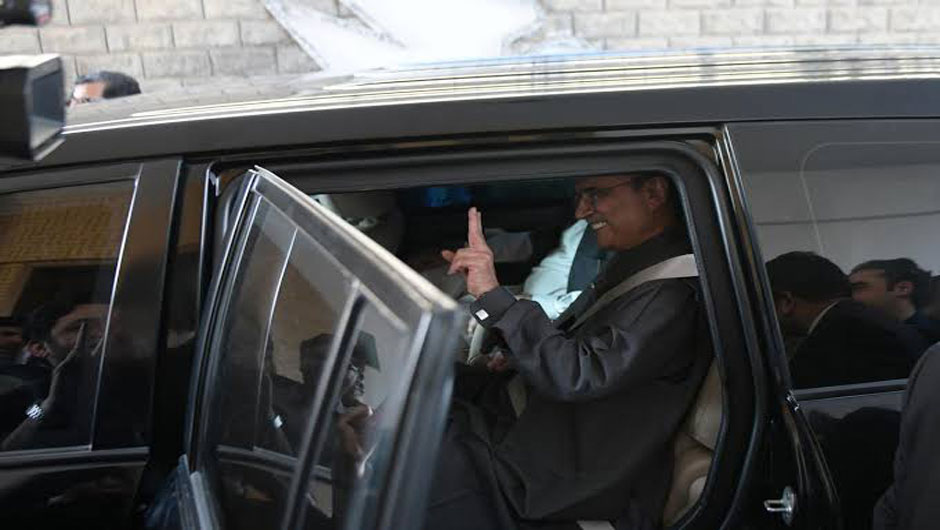 Pakistan People’s Party Co-chairman Asif Ali Zardari. PHOTO: REUTERS/FILE
Pakistan People’s Party Co-chairman Asif Ali Zardari. PHOTO: REUTERS/FILEIt was a shattering blow to the Pakistan Peoples Party (PPP) in June when the party co-chairman Asif Ali Zardari was arrested by the National Accountability Bureau (NAB) just hours after the Islamabad High Court (IHC) recalled a pre-arrest bail granted to him and his sister Faryal Talpur in the infamous fake accounts case.
The former president was taken into custody from his residence in Islamabad from where he was taken to NAB’s office in Rawalpindi. However, the NAB officials could not arrest Talpur as they had no arrest warrants against her.
PPP Chairman Bilawal Bhutto Zardari and other opposition parties reacted strongly. The following month, Zardari was also arrested in the Park Lane case.
Meanwhile, on June 14, arrest warrants for PPP’s Talpur were also issued after which the NAB declared her residence in Islamabad as a sub-jail and placed her under house arrest.
On December 11, Zardari was finally granted bail by the IHC on medical grounds.
Maryam Nawaz Sharif
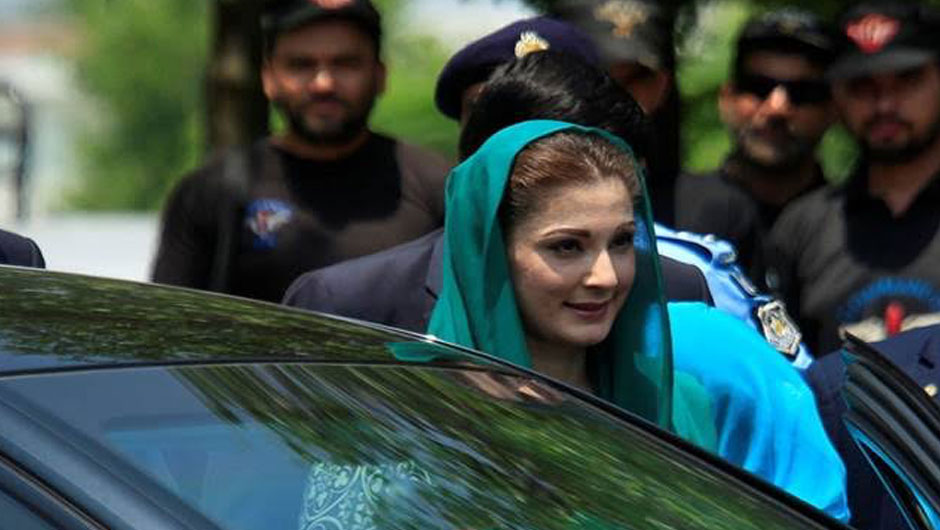 Pakistan Muslim League-Nawaz Vice-President Maryam Nawaz. PHOTO: REUTERS/FILE
Pakistan Muslim League-Nawaz Vice-President Maryam Nawaz. PHOTO: REUTERS/FILETrouble times continue for the Sharifs even in 2019. In August, NAB arrested Pakistan Muslim League-Nawaz (PML-N) Vice-President Maryam Nawaz, as the latest high-profile detention of a member of the Sharif political dynasty.
The daughter of former premier Nawaz Sharif was arrested with her cousin Yousaf Abbas Sharif in connection with the Chaudhry Sugar Mills (CSM) case. NAB got hold of them when they were attempting to visit her father at Lahore’s Kot Lakhpat Jail, where he was being held after being convicted of graft.
The government has long accused the Sharif family of using CSM for money laundering and availing millions of rupees in subsidy without actually exporting sugar.
Maryam’s father, Nawaz, who was disqualified by the Supreme Court in 2017 from holding public office over accusations that eventually led to a seven-year jail sentence for receiving undeclared income, left for London on November 19 to seek medical treatment.
Maryam also moved the Lahore High Court (LHC) to remove her name from the Exit Control List (ECL) as she wants to travel to London to see Nawaz.
Altaf Hussain
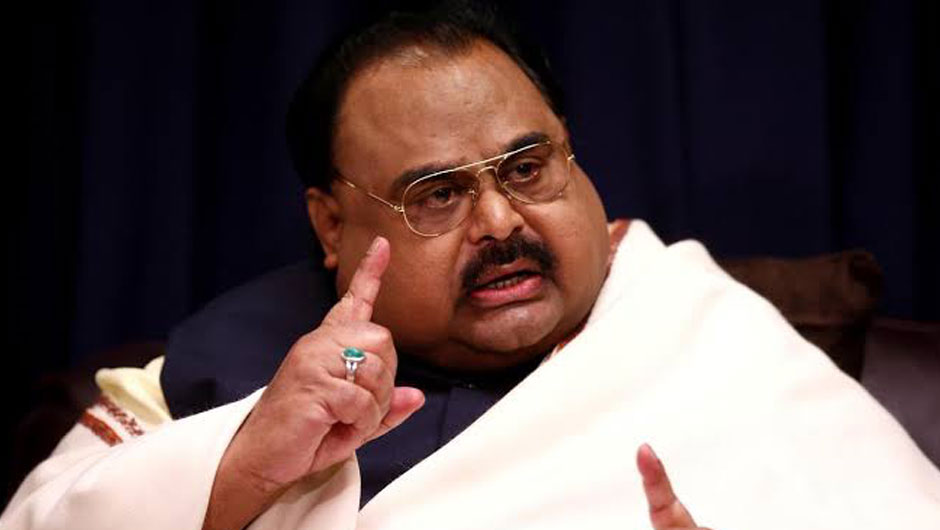 Muttahida Qaumi Movement founder Altaf Hussain. PHOTO: REUTERS/FILE
Muttahida Qaumi Movement founder Altaf Hussain. PHOTO: REUTERS/FILEMuttahida Qaumi Movement (MQM) founder Altaf Hussain — who went into exile in the early 1990s — was arrested in London this June in relation to hate speech made by him on August 22, 2016.
The Metropolitan Police of London arrested Hussain as part of an investigation into provocative speech three years ago in which he urged his party workers and followers to “take the law in their hands”.
Hours after Hussain delivered the incendiary speech; MQM workers had attacked the ARY News office in Karachi.
The Scotland Yard confirmed in a statement that a man in his sixties had been arrested after a joint investigation with Pakistani authorities “in connection with… a number of speeches made by an individual associated with the MQM in Pakistan”. The statement, however, did not identify Hussain. He was later released on bail.
Hussain recently made a headline for asking Indian Prime Minister Narendra Modi to grant him and his supporters, asylum and financial aid.
Khursheed Shah
In September, NAB’s Sukkur chapter arrested senior PPP leader Khursheed Shah in Islamabad in a case pertaining to assets beyond means case.
A team comprising officers of NAB Rawalpindi and Sukkur rounded up Shah and later presented him before an accountability court in his home town Sukkur.
In August, the anti-corruption watchdog had converted an inquiry against Shah into an investigation. Shah faces charges of transferring an amnesty plot in Sukkur Cooperative Society under his name to build a bungalow and owning hotels, filling stations and bungalows registered under the names of his frontmen and benami companies.
NAB arrested senior PPP leader Syed Khursheed Shah in a case regarding his alleged assets beyond means. pic.twitter.com/9hE68TUv4v
— Faisal Sahi (@faysalsahi) September 18, 2019
Ahsan Iqbal
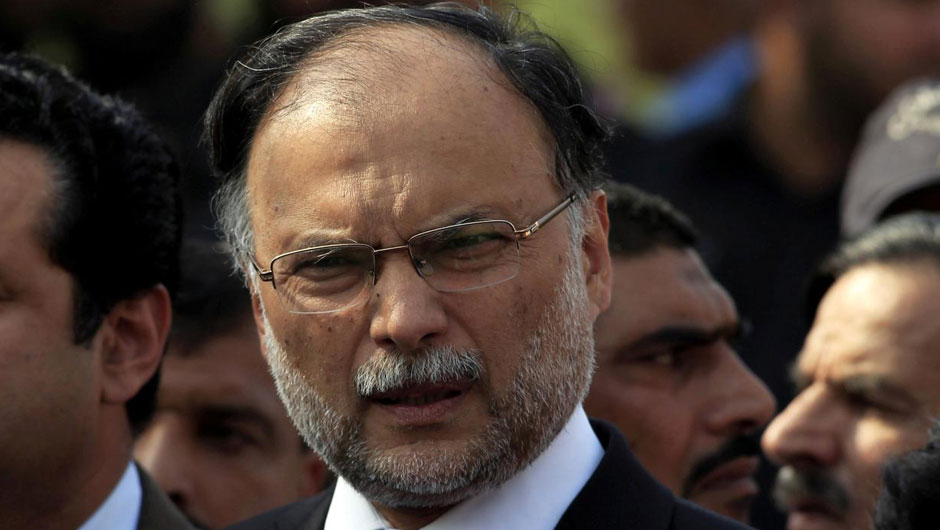 Ahsan Iqbal speaks to media outside the accountability court in Islamabad on October 2, 2017. PHOTO: REUTERS
Ahsan Iqbal speaks to media outside the accountability court in Islamabad on October 2, 2017. PHOTO: REUTERSSenior PML-N leader Ahsan Iqbal was arrested by NAB on December 23 from the anti-corruption watchdog's Rawalpindi office where he had appeared to record his statement in the case regarding alleged corruption in Narowal Sports City (NSC) Project.
The senior PML-N leader is accused of using funds of the government and the Pakistan Sports Board (PSB) for a sports city being established in Narowal — a multi-billion-rupee project.
An accountability court on December 24 gave Iqbal in custody of the NAB for 13 days.
Shahid Khaqan Abbasi
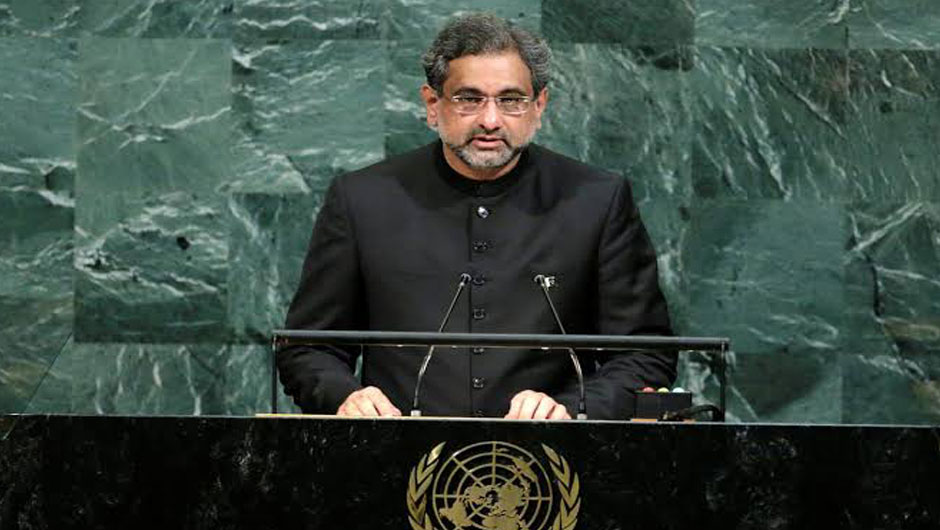 Former prime minister Shahid Khaqan Abbasi. PHOTO: REUTERS
Former prime minister Shahid Khaqan Abbasi. PHOTO: REUTERSIn July, NAB went after former prime minister Shahid Khaqan Abbasi and arrested him in Lahore, prompting opposition accusations that the government was trying to silence criticism.
The anti-corruption agency said in a statement that Abbasi was detained in a case that was opened in 2018 over a liquefied natural gas (LNG) terminal project.
A search was also launched for former finance minister Miftah Ismail in the same case. He was, ultimately, nabbed in the following month after the IHC rejected his plea for bail extension in the case on the grounds that there were not “extraordinary circumstances of hardship”.
The bureau is investigating alleged corruption in the award of a contract to import LNG from Qatar by Abbasi when he was minister for petroleum and natural resources in the cabinet of former premier Nawaz Sharif.
Abbasi is the principal accused in the case that dates back to 2015.
Rana Sanaullah
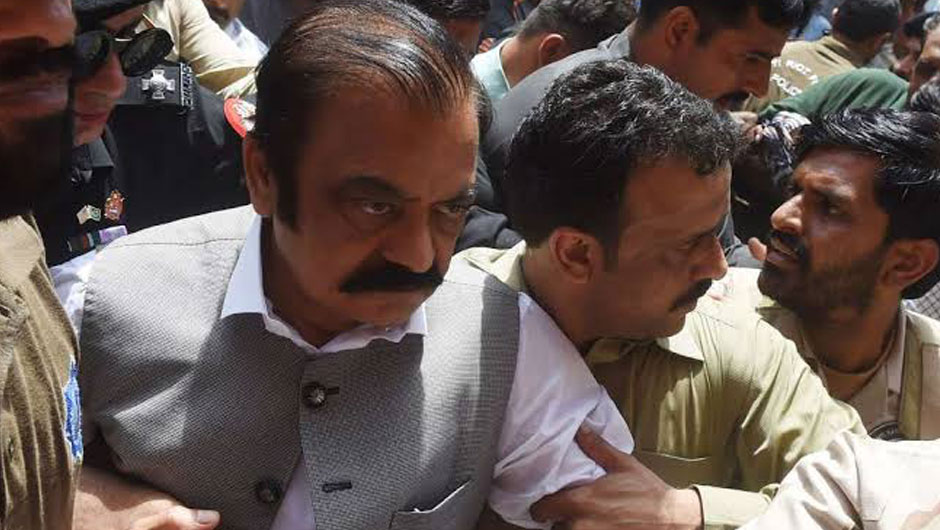 PML-N Punjab President Rana Sanaullah. PHOTO: AFP/FILE
PML-N Punjab President Rana Sanaullah. PHOTO: AFP/FILEEarlier in July before Abbasi’s arrest, the Anti-Narcotics Force (ANF) had detained PML-N Punjab President Rana Sanaullah for allegedly possessing a huge amount of drugs in his vehicle, claim which Sanaullah plainly denied.
Rana, who has served as the Punjab law minister during the previous PML-N government, was arrested from the Islamabad-Lahore motorway near Sukheki, while he was travelling from Faisalabad to Lahore.
His arrest was widely condemned by PML-N and other opposition parties. Time and again, Sanaullah has also criticised the government for his arrest and described it as “an act of cruelty”. The LHC had granted bail to Sanaullah on December 24.
Hamza Shehbaz
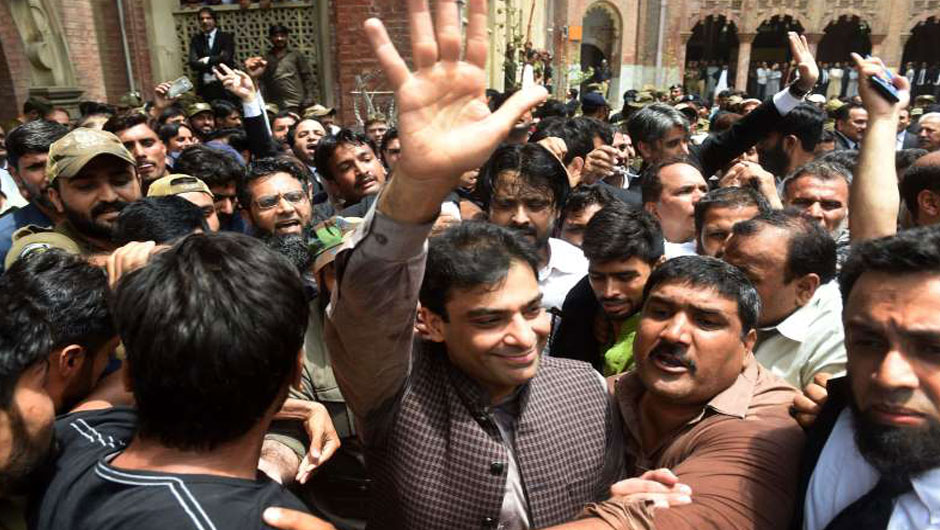 PML-N Vice-President Hamza Shehbaz. PHOTO: AFP/FILE
PML-N Vice-President Hamza Shehbaz. PHOTO: AFP/FILEAnother PML-N Vice-President Hamza Shehbaz had to face the prison in June. Amid a scuffle between police and party supporters, officials of NAB arrested him in Lahore after his attorney withdrew his client’s bail plea in LHC.
Hamza, who is also the opposition leader in the Punjab Assembly, has been under NAB investigation in cases involving Ramzan Sugar Mills, Saaf Paani project and assets beyond known means of income.
NAB claimed to have found evidence of money laundering on a massive scale through which Hamza and his family allegedly accumulated assets in the United Kingdom.
According to sources privy to NAB’s investigation, the allegedly illegally accumulated assets are worth Rs85 billion to Rs100 billion and were bought during Shehbaz Sharif’s tenure as the chief minister of Punjab. The bureau also claimed to have found that Hamza’s declared assets in 2003 were worth less than Rs20 million, which increased by almost 2,000% to over Rs410 million after his father became the chief minister.
Agha Siraj Durrani
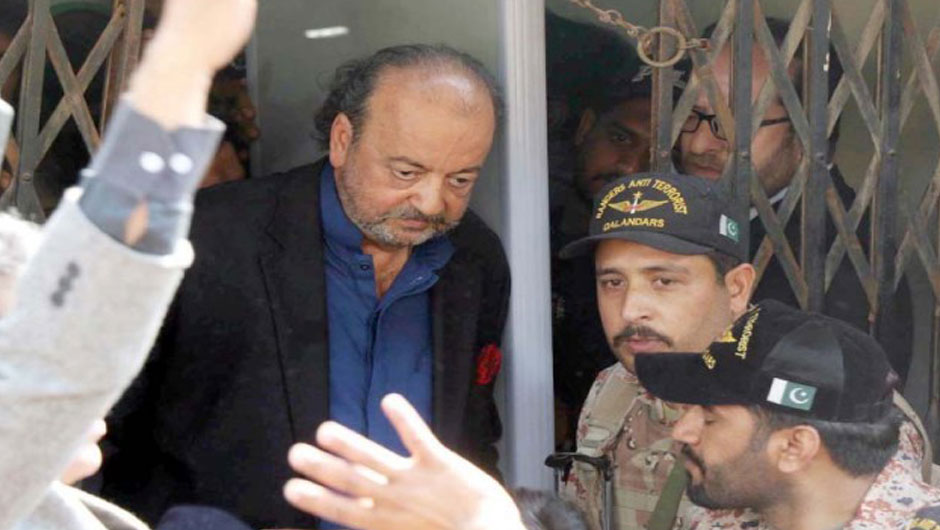 Sindh Assembly Speaker Agha Siraj Durrani. PHOTO: ONLINE
Sindh Assembly Speaker Agha Siraj Durrani. PHOTO: ONLINEIn an unprecedented move, the country’s top graft buster arrested Sindh Assembly Speaker Agha Siraj Durrani from a hotel in Islamabad in February.
He was arrested in connection with its probe into a case related to Durrani’s ‘assets beyond his known sources of income’.
According to a press release issued later, a team of NAB Karachi took Durrani into custody in collaboration NAB Operation Division and the Intelligence Wing of NAB headquarters.
NAB said in its statement that Durrani was accused of having assets beyond known sources of income. He was later presented before an accountability court in Islamabad.
The Sindh High Court (SHC) on December 13 accepted his bail plea and ordered to place Durrani’s name on the ECL.
Aleem Khan
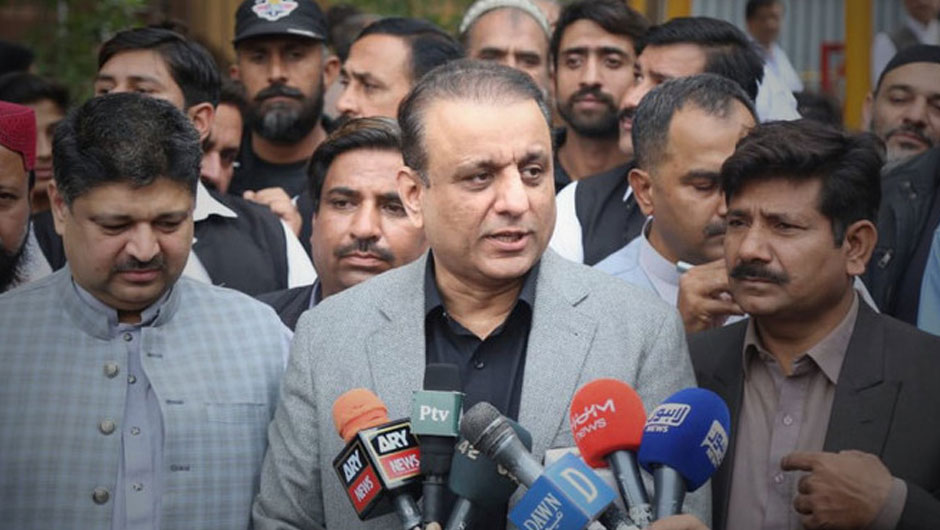 Pakistan Tehreek-e-Insaf leader Aleem Khan. PHOTO: ONLINE
Pakistan Tehreek-e-Insaf leader Aleem Khan. PHOTO: ONLINEEarlier in February, Pakistan Tehreek-e-Insaf (PTI) leader and senior Punjab minister, Aleem Khan, was taken into custody by the NAB in Lahore for having assets beyond known sources of income.
He was arrested after he appeared before the anti-graft watchdog in a case pertaining to the offshore company revealed in the Panama Papers leaks as well as accumulating assets beyond known sources of income.
After his arrest, Khan stepped down as the provincial minister.
NAB had earlier summoned Khan twice but he failed to convince the accountability watchdog. Later, NAB asked him for more documents in the case. It was found out during the investigation that the Khan owned many flats in the United Arab Emirates (UAE) and the United Kingdom (UK).
Sibtain Khan
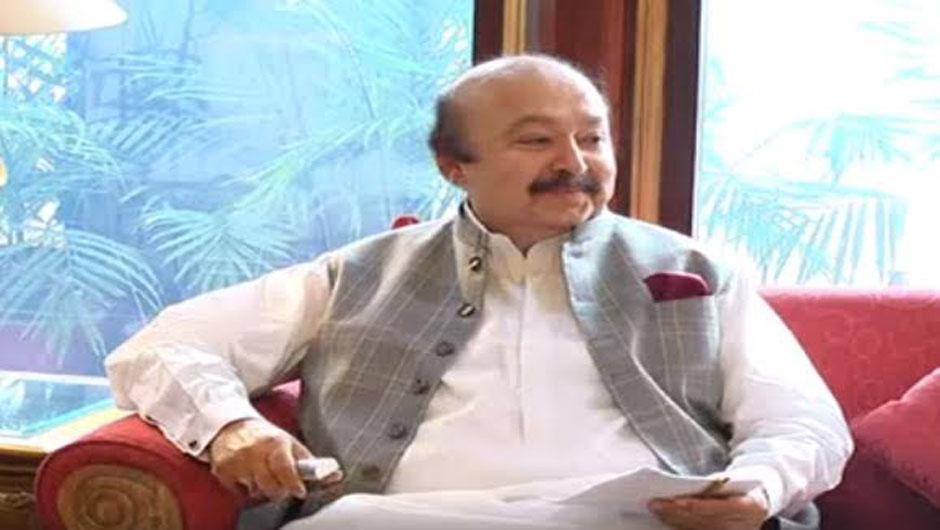 PTI leader Sibtain Khan. PHOTO: ONLINE
PTI leader Sibtain Khan. PHOTO: ONLINEIn June, Punjab Minister for Forestry, Wildlife and Fisheries Sibtain Khan was arrested by the NAB over charges of corruption and illegal award of contracts during his previous tenure as Punjab minister for mines and minerals in 2007.
After the arrest Sibtain – also a PTI politician – gave his resignation to Punjab Chief Minister Usman Buzdar asserting that he would contest his case on merit which was later reportedly accepted.
During court proceedings at an accountability court in Lahore, NAB prosecutor told the court that the Earth Resource Pvt Ltd (ERPL), which was awarded the ‘illegal’ contract, was not registered. However, Sibtain had rejected the allegations.
An LHC division bench later granted bail to former provincial minister Sibtain Khan in the Chiniot mining contract case.
1730806656-0/BeFunky-collage-(23)1730806656-0-405x300.webp)





1730806490-0/New-Project-(2)1730806490-0-270x192.webp)
1730802981-0/Untitled-design-(53)1730802981-0-270x192.webp)

1730799445-0/Untitled-design-(52)1730799445-0-270x192.webp)
1730800230-0/Copy-of-Untitled-(5)1730800230-0-270x192.webp)




1730706072-0/Copy-of-Untitled-(2)1730706072-0-270x192.webp)
COMMENTS
Comments are moderated and generally will be posted if they are on-topic and not abusive.
For more information, please see our Comments FAQ